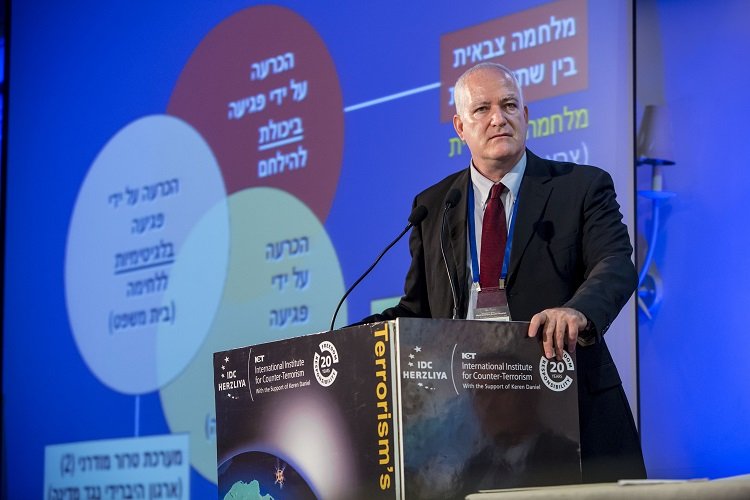From PR to FP: Minding the Gap between ‘Real-World’ Foreign Policy and Debate ‘Sample Size’ Material
 By Nati Katz, Manager, Technology Practice, Burson-MarstellerMitt Romney yesterday stated that Presidential hopeful Donald Trump is unworthy of the Presidency, since he has neither the temperament nor the judgment for the job. What stood out in his speech, is rather a bold statement for the world to hear, stating Trump’s “foreign policies would make America and the world less safe”. Trump retaliated in last night’s debate with elaborative promises and approaches on how to deal with ISIS and the global war on terror. These are all good as statements, but as one Apple encryption saga has shown us, the complexities can’t fit into soundbites.And boy, are the soundbites out there. It was a week full of foreign policy remarks such as Cruz’s ‘unapologetic support for Israel’ vis-à-vis Trump’s pledge of neutrality in the Israel-Palestinian negotiations. Striking fear in voters’ hearts during political campaigns is nothing new, nor is the garnering of electorate points based on promises.Professor Boaz Ganor, founder and Executive Director of the International Institution of Counter Terrorism at IDC, believes the current international position the US finds itself in, poses unprecedented complexities no candidate can currently tackle in soundbite. “I’m not familiar with domestic policy like healthcare, but where foreign affairs is concerned – leadership merely to maintain the last eight years’ actions,” – tells me Professor Ganor, - “is the last thing the world needs”.
By Nati Katz, Manager, Technology Practice, Burson-MarstellerMitt Romney yesterday stated that Presidential hopeful Donald Trump is unworthy of the Presidency, since he has neither the temperament nor the judgment for the job. What stood out in his speech, is rather a bold statement for the world to hear, stating Trump’s “foreign policies would make America and the world less safe”. Trump retaliated in last night’s debate with elaborative promises and approaches on how to deal with ISIS and the global war on terror. These are all good as statements, but as one Apple encryption saga has shown us, the complexities can’t fit into soundbites.And boy, are the soundbites out there. It was a week full of foreign policy remarks such as Cruz’s ‘unapologetic support for Israel’ vis-à-vis Trump’s pledge of neutrality in the Israel-Palestinian negotiations. Striking fear in voters’ hearts during political campaigns is nothing new, nor is the garnering of electorate points based on promises.Professor Boaz Ganor, founder and Executive Director of the International Institution of Counter Terrorism at IDC, believes the current international position the US finds itself in, poses unprecedented complexities no candidate can currently tackle in soundbite. “I’m not familiar with domestic policy like healthcare, but where foreign affairs is concerned – leadership merely to maintain the last eight years’ actions,” – tells me Professor Ganor, - “is the last thing the world needs”.
"The world of national security, intelligence, counter terrorism and foreign affairs is unlike any other sector and industry in its extreme distinction between what is said and what is possibly done."
It is an unparalleled arena where the majority of the practice takes place with or without public debate, in line or aside of public opinion, and in most cases – far from the podiums of speakers. I met with Professor Ganor this week, for an in-depth briefing on what exactly is the state of the war on terror, the Middle East arena, ISIS, and why there is absolutely no precedence regardless of how the Apple-FBI saga concludes.Like a distorted mirror, the Apple-FBI debate has come out to the public, yet unreflective of what is really going on and how much of it is a competition to score points among the general public. “Of course it's happened before”, says Ganor, and believes it is happened with Apple and various other technology companies. “Regardless, law enforcement doesn't need Apple, Facebook, or Telegram in order to actively monitor the activity on those platforms”. In Ganor's view, it's the FBI attempting to score points and show how effective they are in battling and investigating terrorist activity, while Apple wishes to woo customers in showing its commitment to their data and privacy.As a perfect expression of this notion, we witnessed many of the known technology startups taking sides in the case, likely for mere PR value, regardless of how useful they may or may not be, "if it happened to them". Rebuking the federal government included companies like Google, whose NSA-alliance has been a matter of public debate last year, and Telegram - regarded in the US as 'ISIS's preferred messaging app'. Its founder, Pavel Durov was quoted on CNN saying "Opening 'back door' to encrypted apps could aid terrorists".The constant development of technology, encryption, and counter-encryption is a cat & mouse chase. Technology in our age has brought society and global economy some of the most powerful means of growth and advancements, but in its double-edged sword nature, experts like Ganor want to advocate for a balance. “I’d like to see more mutual recognition of the sides’ needs”. Ganor thinks this case will conclude in court – which will seek that balance on a case by case basis, rather than setting a precedence for all future instances. "Yes, I strongly believe that even 'secret' photo, video and text apps - all have the data documented and stored, for whatever amount of minimum time at the least". And that data, he stresses, if proven to court as vital to avoiding the next attack or understanding the dynamics behind the previous ones, must be surrendered.I asked the world-renowned expert, who’s been advising Presidents, intelligence agencies and military officials, how can world affairs, ISIS and foreign relations be communicated in a way that does justice to the complexities yet can be conveyed in ‘sample size’. I was impressed to learn there is a very simple response. "I have been honing my expertise for nearly forty years. I’ve seen the widest possible array of terrorist profiles and dynamics of attacks and movements in modern warfare. And I can put it all into one simple equation”. Prof. Ganor explains there are just two components in this scientific formula: motivation X capability. “It is the most widely-applicable formula across all forms of terror. When capabilities are neutralized, motivation is meaningless, and when motivation is eliminated, capabilities are nice to have, and symbolic”.What differs the US from say, Russia or Syria, is where to put the weight and efforts. In the US, claims Ganor, there is a bi-partisan inherited belief that motivation is everything. “We’ve seen it since Bush 43, and through the current administration – democratization and public diplomacy, almost in an imposing manner”. On the flipside, the Middle Eastern players such as Israel, operate under the impression it’s all about dismantling capabilities through operative activities. “It has been effective on the ground, but today motivation is off the charts”.These are all the ‘tip of the iceberg’ but in a closer look, the multiple layers appear – and things are no longer fitting to the 140-character standard. Ultimately, I conclude, in PR and communications, it’s the bearer of information who has the ability to leverage on wider array of topics, deeper insights, and a breadth of possible angles.[author]About the Author: Nati Katz serves as a manager in the technology practice at global PR agency Burson- Marsteller, a Young & Rubicam Group company. He owns none of the above mentioned stocks, and does not have a professional relationship with the companies included in this piece. You can follow him at on twitter and LinkedIn [/author]
I met with Professor Ganor this week, for an in-depth briefing on what exactly is the state of the war on terror, the Middle East arena, ISIS, and why there is absolutely no precedence regardless of how the Apple-FBI saga concludes.Like a distorted mirror, the Apple-FBI debate has come out to the public, yet unreflective of what is really going on and how much of it is a competition to score points among the general public. “Of course it's happened before”, says Ganor, and believes it is happened with Apple and various other technology companies. “Regardless, law enforcement doesn't need Apple, Facebook, or Telegram in order to actively monitor the activity on those platforms”. In Ganor's view, it's the FBI attempting to score points and show how effective they are in battling and investigating terrorist activity, while Apple wishes to woo customers in showing its commitment to their data and privacy.As a perfect expression of this notion, we witnessed many of the known technology startups taking sides in the case, likely for mere PR value, regardless of how useful they may or may not be, "if it happened to them". Rebuking the federal government included companies like Google, whose NSA-alliance has been a matter of public debate last year, and Telegram - regarded in the US as 'ISIS's preferred messaging app'. Its founder, Pavel Durov was quoted on CNN saying "Opening 'back door' to encrypted apps could aid terrorists".The constant development of technology, encryption, and counter-encryption is a cat & mouse chase. Technology in our age has brought society and global economy some of the most powerful means of growth and advancements, but in its double-edged sword nature, experts like Ganor want to advocate for a balance. “I’d like to see more mutual recognition of the sides’ needs”. Ganor thinks this case will conclude in court – which will seek that balance on a case by case basis, rather than setting a precedence for all future instances. "Yes, I strongly believe that even 'secret' photo, video and text apps - all have the data documented and stored, for whatever amount of minimum time at the least". And that data, he stresses, if proven to court as vital to avoiding the next attack or understanding the dynamics behind the previous ones, must be surrendered.I asked the world-renowned expert, who’s been advising Presidents, intelligence agencies and military officials, how can world affairs, ISIS and foreign relations be communicated in a way that does justice to the complexities yet can be conveyed in ‘sample size’. I was impressed to learn there is a very simple response. "I have been honing my expertise for nearly forty years. I’ve seen the widest possible array of terrorist profiles and dynamics of attacks and movements in modern warfare. And I can put it all into one simple equation”. Prof. Ganor explains there are just two components in this scientific formula: motivation X capability. “It is the most widely-applicable formula across all forms of terror. When capabilities are neutralized, motivation is meaningless, and when motivation is eliminated, capabilities are nice to have, and symbolic”.What differs the US from say, Russia or Syria, is where to put the weight and efforts. In the US, claims Ganor, there is a bi-partisan inherited belief that motivation is everything. “We’ve seen it since Bush 43, and through the current administration – democratization and public diplomacy, almost in an imposing manner”. On the flipside, the Middle Eastern players such as Israel, operate under the impression it’s all about dismantling capabilities through operative activities. “It has been effective on the ground, but today motivation is off the charts”.These are all the ‘tip of the iceberg’ but in a closer look, the multiple layers appear – and things are no longer fitting to the 140-character standard. Ultimately, I conclude, in PR and communications, it’s the bearer of information who has the ability to leverage on wider array of topics, deeper insights, and a breadth of possible angles.[author]About the Author: Nati Katz serves as a manager in the technology practice at global PR agency Burson- Marsteller, a Young & Rubicam Group company. He owns none of the above mentioned stocks, and does not have a professional relationship with the companies included in this piece. You can follow him at on twitter and LinkedIn [/author]

